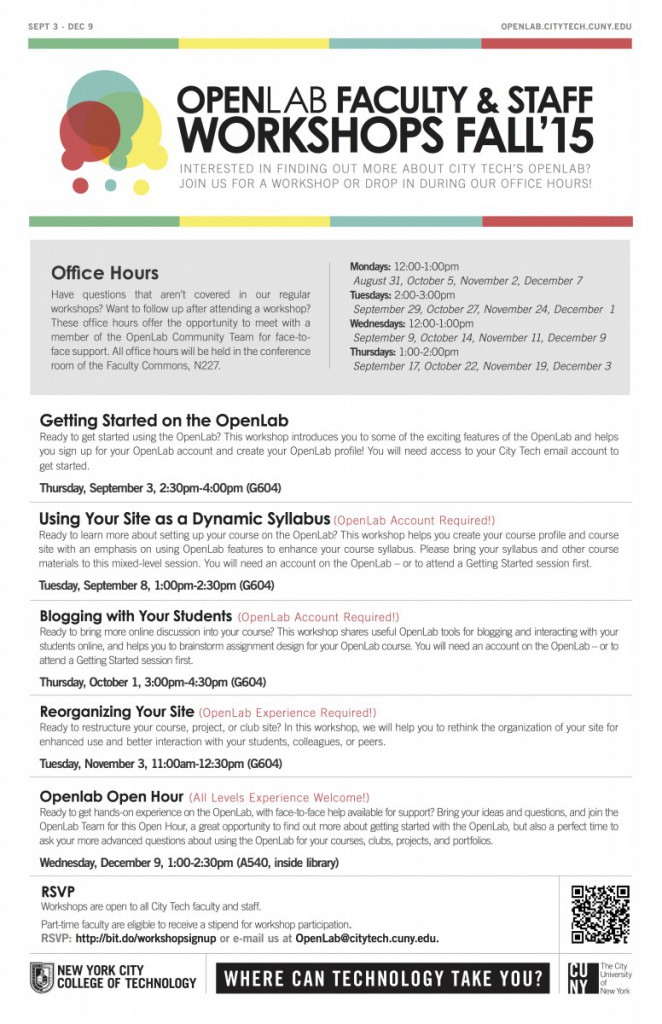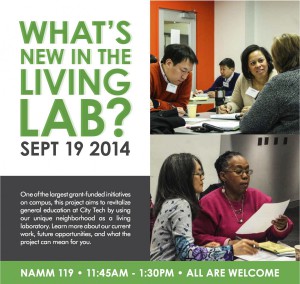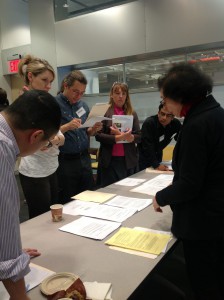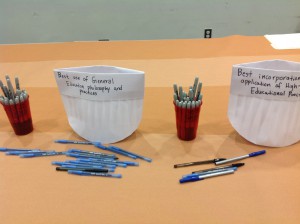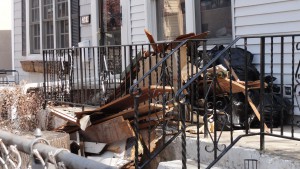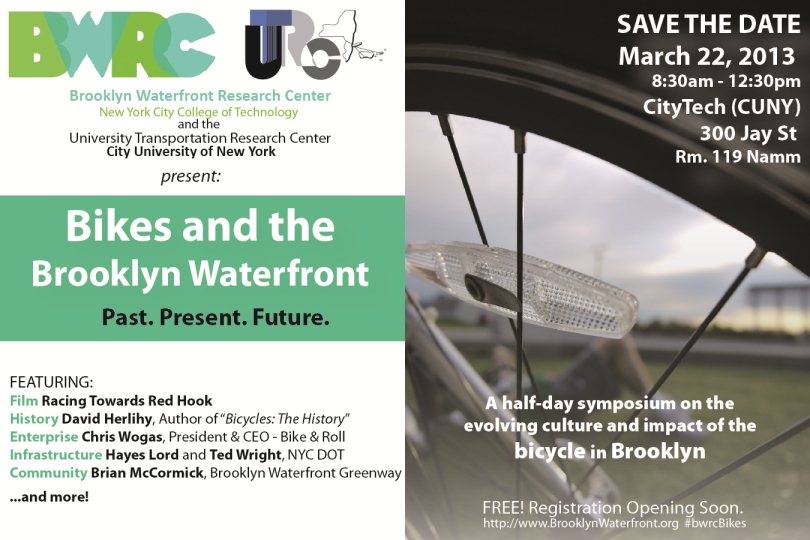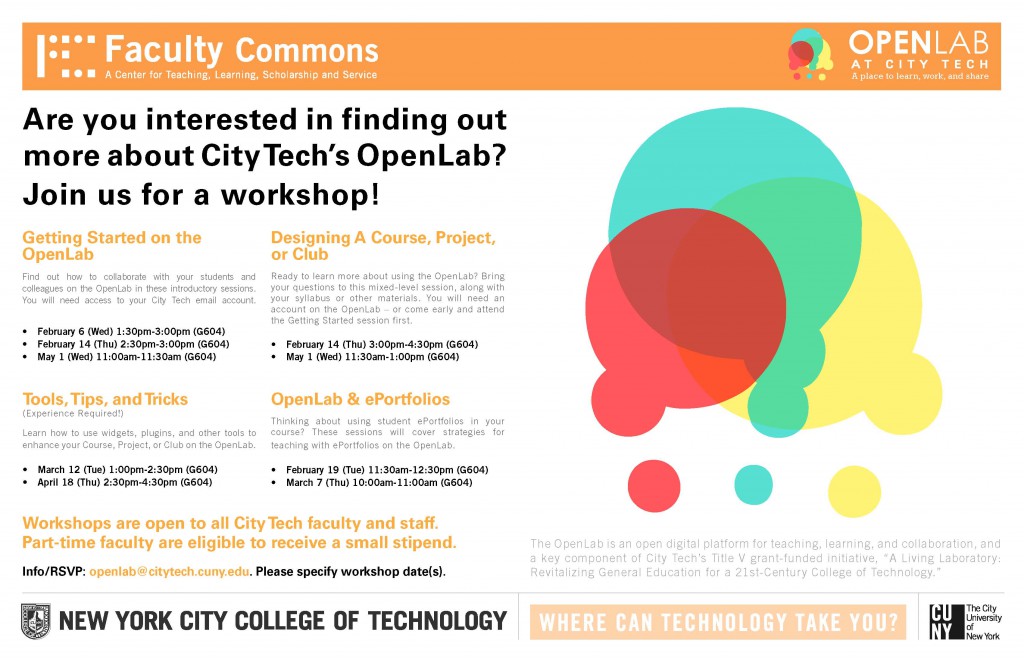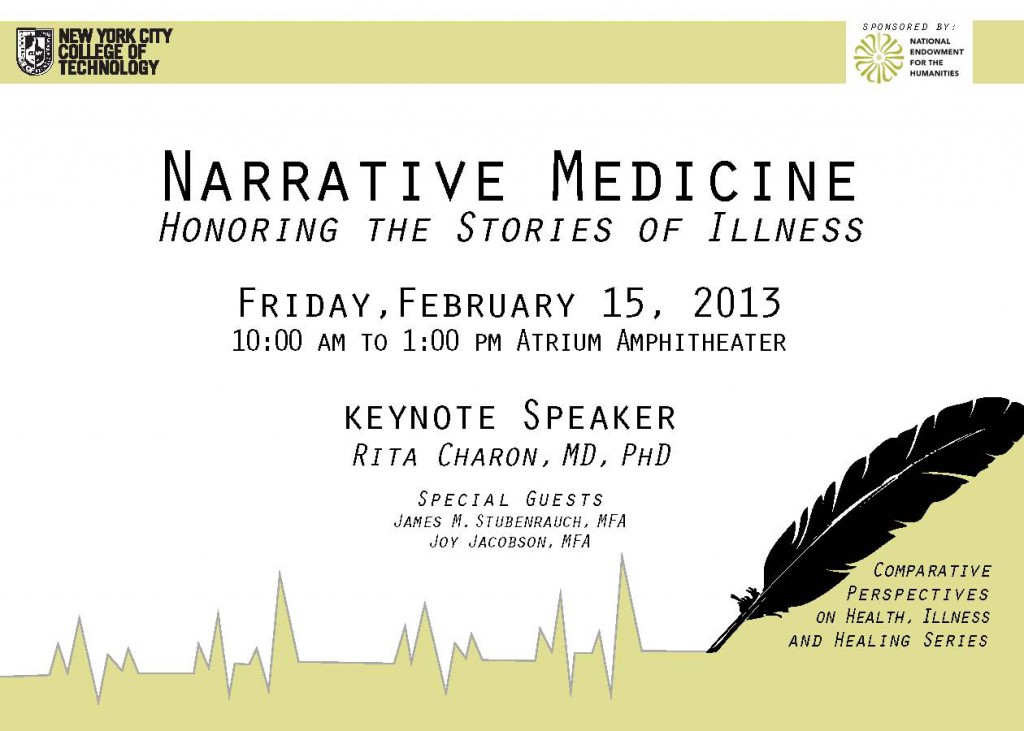A Living Laboratory: Revitalizing General Education for a 21st-Century College of Technology
GENERAL EDUCATION SEMINAR — Spring 2014
Call for Faculty Fellows Join us in the Living Lab
To apply, please complete the application form: http://tinyurl.com/genedseminar
Application Deadline: 1:00pm, Thursday, November 7, 2013
DOWNLOAD Information on the Living Lab Faculty Fellowship Application here
“A Living Laboratory: Revitalizing General Education for a 21st-Century College of Technology” is a five-year initiative (2010-2015) funded by the U.S. Department of Education’s Strengthening Hispanic-Serving Institutions (Title V) program. Its mission is to re-envision General Education at City Tech as a “living laboratory,” using City Tech’s signature strengths: hands-on experiential models of learning and our vibrant Brooklyn Waterfront location.
We are seeking faculty members to join the General Education Seminar, one of the central activities of the Living Lab, in Spring 2014 and become part of a growing interdisciplinary community of Fellows who are enthusiastically engaged in this transformational effort.
The Gen Ed Seminar
Each year, 18 Faculty Fellows participate in an intensive seminar during the Spring semester, exploring innovative pedagogical approaches that they then incorporate into their courses in the Fall. In the second year of their participation, Fellows recruit and mentor colleagues, attend a series of workshop and events, and collaborate to produce a final report.
Three cohorts of Fellows have taken part in the Seminar to date – the first explored General Education concepts through the lens of the first-year student experience, the second examined collaborative field-based research and the third engaged in academic service learning.
The fourth, and final, cohort will address culminating experiences – capstone courses, internships, global learning (travel experiences), and other courses that focus on the last requirements for degree programs.
Among the questions seminar participants will consider are these:
– What changes can we make to culminating courses that will not just prepare our students to transfer their success at City Tech into careers and further studies but also support creative, original, and critical thinking through the use of high-impact educational practices?
– How can we use one of City Tech’s greatest assets — its location within the “living laboratory” of the downtown Brooklyn waterfront— to create hands-on, place-based learning opportunities with our students?
– How can we use the City Tech OpenLab, an open-source digital platform, to customize learning experiences for our students that will engage them in the intellectual fabric of our College and make their achievements visible to our own community and to the wider public?
The Living Lab Grant
“A Living Laboratory: Revitalizing General Education for a 21st-Century College of Technology” has four interrelated activities:
1) The General Education Seminar: brings together diverse groups of Faculty Fellows to revitalize General Education through place-based learning and high-impact educational practices;
2) The OpenLab (https://openlab.citytech.cuny.edu): creates an innovative digital platform to support open teaching and learning at City Tech, and enhance the intellectual and social fabric of the college community;
3) A Culture of Assessment: integrates comprehensive outcomes assessment into the Gen Ed curriculum;
4) The Brooklyn Waterfront Research Center: builds an endowment to support student and faculty research at this newly-created City Tech institution.
The Schedule
Spring 2014
Fellows will participate in weekly activities, attend public college-wide events, and plan capstone courses, internships or other culminating experiences of the associate or baccalaureate level programs they will teach in the Fall of 2014. Fellows will also commit to using the OpenLab actively for all seminar-related work and teaching. Participating faculty will receive a 3-credit course release during this semester.
Fall 2014
Fellows will implement what they have learned in their classrooms and on the OpenLab. Fellows will participate in four meetings or workshops.
Spring 2015
Fellows will mentor colleagues with the intent of applying seminar findings to additional courses and sections.
Fall 2015
After a thorough examination of both theory and implementation, the seminar cohort will write a final report with recommendations for specific courses and the broader vision of general education at City Tech.
Eligibility
To take part in the seminar, faculty must be:
– full time;
– able to make a two-year commitment (January 2014 through December 2015)
– available on Fridays in Spring 2014 to participate in grant activities; availability will also be required on several Fridays through Fall 2015;
– teaching a capstone course, internship or other culminating experience in Fall 2014; – willing to work in a highly collaborative environment;
– willing to use the OpenLab (https://openlab.citytech.cuny.edu) for all seminar-related activities and teaching (training and support will be provided);
– approved by their department chair.
Compensation
Faculty Fellows will receive 3-credits of release time during the Spring 2014 semester. Work done as part of this project is vital service to the College.
Application Process
Fellows will be chosen based on the strength of their statements of interest and their commitment to participate fully in all activities. We seek to convene a heterogeneous group of faculty members who bring intellectual vitality and a passion for teaching to City Tech.
To apply, please complete the application form: http://tinyurl.com/genedseminar
Application Deadline: 1:00pm, Thursday, November 7, 2013
Further Information
Please contact Karen Goodlad, Living Lab General Education Seminar Co-Director, at kgoodlad@citytech.cuny.edu or Alexander Aptekar, Living Lab General Education Seminar Co-Director at aaptekar@citytech.cuny.edu if you have questions or need additional information.

